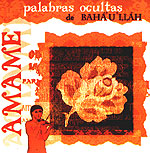BAFA © 2010. All material here is copyrighted. See conditions above. |
Leonor Dely
singer, composer, Colombia
|
The New York Times critic, Tom Conelli, hailed her 2001 CD Ámame - Palabras Ocultas de Bahá'u'lláh as "A musical masterpiece throughout! A must for any world music enthusiast!"
Multi Grammy Award winner producer, KC Porter, said of her: "Her music has some of the most powerful rhythmic diversity I've ever heard, and on top of that, the words she has put to music are breathtakingly inspiring. She's a mix between Cesarea Evora and The Buena Vista Social Club with incredible spiritual depth."
But who is Leonor Dely? What makes her music, her voice and her message so unique and powerful? Leonor tells us about herself and her music.
|
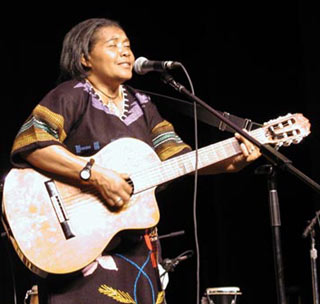 Leonor Dely, 2002.
Leonor Dely, 2002.
|
 Leonor Dely, 1990.
Leonor Dely, 1990.
|
My father, who was of African descent, came from Tumaco, a fishing port on the forlorn Pacific Coast of Colombia. My mother, of Native American descent, was from Tolima, in the central valleys between the Andes mountain ranges. From them I inherited the passion for music. My father, an English, Spanish and Literature teacher by profession, played the guitar, sang boleros and wrote poetry. My mother, a grade school teacher, played the tiple (of the family of the guitar) and also sang beautifully. She used to teach drama at school. From the age of five, I received dancing lessons: classical, modern and folklore, which brought me in touch with a wide variety of music. During my high school years, I would participate in all sorts of song contests and festivals. I sang in the school choir and the popular music band. By that age (12-14), I knew and sang all the then fashionable Colombian and Latin American songs.
|
I went to the capital, Bogota, to pursue my university studies at the Universidad Pedagógica at the faculty of Physical Education and Psychopedagogy. I also took four semesters in Music Pedagogy, majoring in singing, tiple and bandola (plucked string instruments typical of Central Colombia).
All along I was an active member of the student band, the string quartet, the Renaissance music choir, and I also sang protest, folk and pop songs with different groups outside the campus.
For over seven years, I formed part of Jacinto Jaramillo's professional Folklore Ballet Cordillera, which took its repertoire of dance and dance drama to several countries.
|
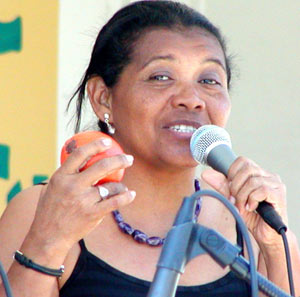 Leonor Dely, 2002.
Leonor Dely, 2002.
|
With them I was able to deepen my knowledge of the different music styles of Colombia, which has the richest ethnic cultural diversity in the Western Hemisphere. After I graduated from university, I spent a further year performing and traveling with the Folklore Ballet. I then began my career as high school teacher in the public education system, in the area of Physical Education, and on and off Music and Dance. I've been teaching for over twenty years now. Not long ago I got a post-graduate degree in Artistic Education and Folklore.
In Paris, 1976, I met Istvan (a Hungarian linguist, writer, translator, jazz percussionist), who was to become my husband and companion in all the battles of life and arts. After my late father, Istvan was the one who most encouraged me to sing and play music.
We settled in Cartagena, on the Caribbean Coast of Colombia, where we still live. Cartagena is the old colonial capital of slave trading, and saw repeated sieges by English and French bucaneers and pirates. It was the first to declare independence from Spain. Here we were fortunate and privileged to be introduced to Bahá'u'lláh's teachings, which we both embraced wholeheartedly and passionately in 1980. The Bahá'í Faith has thus become the navigation chart, the compass and the driving force of our marvelous, never ending journey of light and sound together.
|
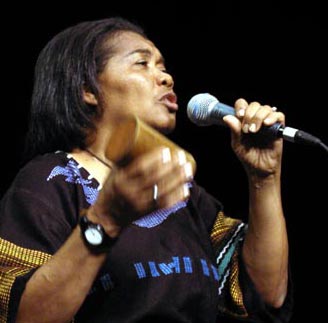 Leonor Dely, 2002.
Leonor Dely, 2002.
|
We started to play music in duo: I sang with the guitar all the music I had learned so far and Istvan accompanied me with the Afro Cuban percussion he had learned in Cuba. On his prompting I learned the sacred songs of the Santería, and also the rumba (yambú, guaguancó, Columbia) of the barrios of Havana.
Then, together, we started to explore new provinces and worlds of music. As our two sons, David and Shangó, grew in the middle of all this music making, they, too, showed signs of having inherited this 'addiction'.
So in 1986 Istvan founded the first drumming school in Cartagena, free for all who would come, and our kids and myself became the first pupils.
|
Our home became a thoroughfare for a steady flow of local youth, who came to relearn the all-but-lost drumming traditions of their forefathers. We researched and deepened our knowledge of the Afro Colombian folklore of the North Coast, and also learned Afro Cuban, Puerto Rican and Brazilian percussion and songs.
Out of this drumming school we consolidated Millero Congo, an experimental Africaribbean acoustic fusion performing group, with our family of four in the unchanging core and a fluctuating outer circle of four to six young local musicians. Our aim was to rescue, reclaim, develop and teach the African heritage in the music of the Circumcaribbean.
|
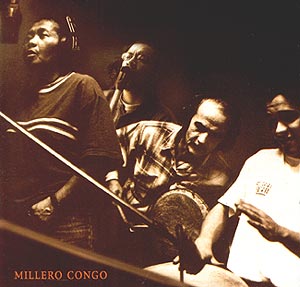 Millero Congo, 2001.
Millero Congo, 2001.
|
We passionately promoted a discourse and practice of the defense of ethnic cultural diversity, especially of the African and Native American minorities.
For 12 years, I was the lead vocalist and songwriter, and played the acoustic guitar and a growing array of ethnic drums and percussion. Millero Congo became a recognized, major authority of practical and theoretical cultural ecology and a school for young musicians on the Colombian North Coast - first in Cartagena, then in Barranquilla (the metropolis of the North Coast, about three million inhabitants).
We had a lot of press reviews, radio interviews, TV feature shows, concerts, festivals, and workshops during those years. We were held as one of the serious cultural entities spearheading a wide and successful movement to recover and revalue traditional drumming music among city youth in Colombia. Our sons 'graduated' from this process as brilliant, unusually versatile, highly original and creative musicians. David currently works in Budapest, Hungary, and Shangó in Los Angeles, USA.
Of course, in this broad cultural struggle we were always motivated and guided by Bahá'í principles, such as unity and diversity and the protection of the cultural identities of all peoples and races. But we also applied our music and musicianship to Bahá'í teaching work and proclamation. One of the most interesting and gratifying initiatives was a series of teaching trips, "Musicampaigns", to several central regions of Colombia (1994-95). As part of this project, we recorded in Bogotá our first cassette Busca la Luz (Seek the Light) of our compositions to the Hidden Words. It was distributed mainly within the national Bahá'í community. It was the first stage of a process that later culminated in my CD Ámame - Palabras Ocultas de Bahá'u'lláh, in which I acted on my growing conviction to use Bahá'u'lláh's words and not my own.
As a Bahá'í I have an intimate and daily recourse to Bahá'u'lláh's words and I wanted to sing them verbatim, as they come in Spanish. I started thinking of a CD that would combine the words from the little volume of mystical-ethical poems, Hidden Words, with the greatest possible variety of traditional rhythms and music forms of Colombia and the Circumcaribbean, as we were used to playing them in our Millero Congo group. In a first attempt and with an ardent desire, I was inspired to compose music to a different Hidden Word almost every day during the fast of 1994.
These initial ideas then began taking fuller shape: I would start out accompanying the melody of my voice on my acoustic guitar, the melody having been born out of the words and not vice versa - that is, not trying to force the words into a melody. I was always sure Istvan would know exactly what percussion was needed for each piece and style. I sang many of these compositions to the accompaniment of Native Indian flutes and the powerful African drums of Millero Congo in public concerts or Bahá'i events and firesides until they became more and more polished.
Finally in November 1999, we recorded in Bogotá a demo CD with what was to become the backbone of the Ámame CD. We sent some of it in MP3 format to multiple Grammy Award winner music producer KC Porter (himself a Bahá'í) in Los Angeles. In his position, he receives hundreds of offers every day and of course turns most of them down. So I was immensely fortunate to catch his attention with my voice and the unusually powerful and varied ethnic drumming of the music. He offered to finance and produce the professional recording and release of the album under his own label, Insignia Records.
The album contains 19 compositions, each in a unique, distinct rhythm and music style, a synthesis of my personal and artistic evolution, with a flavor that integrates memories of the Andes and the Caribbean. It channels to ears and hearts a sacred message to meditate and reflect upon and to transmute the soul through the power of Love. It is at once the fruit of all these years together in music and family, and the beginning of a new cycle in my life, more intense and fruitful than ever, destined to take our accumulated experience and passion to more parts of the world.
|
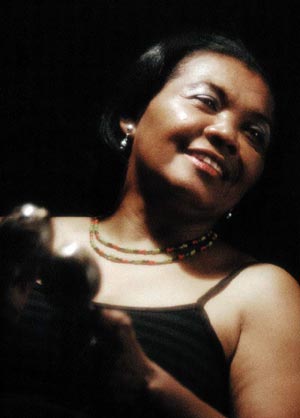 Leonor Dely, 2002.
Leonor Dely, 2002.
|
We have toured the US with Ámame twice (Summer 2001 and 2002), Millero Congo teaming up with top Bahá'í musicians living there. I'd just mention two highlights: on the first tour, we were privileged to perform at the inauguration event of the national Building the Kingdom Conference in Milwaukee to over ten thousand Bahá'ís. On the second tour, our Los Angeles concert was transmitted live to audiences all over the world. It was the first live concert broadcast of the recently created first Bahá'í web radio station, Radio Nur.
During the second trip we finished the recording of our second album, Talisman, also produced by KC Porter on Insignia Records. This album creates new sound worlds and opens up, more than Ámame did, to the general music market. It is centered around the sacred African drumming traditions of the Circumcaribbean (Lumbalú, Santeria, Vodoun, Winti), in a very contemporary fusion with a substantial Anglo input (reggae, world funk).
|
It sounds so overwhelmingly powerful that it will surely transcend the barriers of marketing under labels such as "world music", "ethnic music" and "religious project", which hampered Ámame's broader distribution beyond the Bahá'í market.
We don't want to make "Bahá'í music for Bahá'ís". We want to take Bahá'u'lláh's words and spirit to everybody, through a new music style that powerfully welds together North and South, Black and White, and, we hope, will "set the hearts of the listeners ablaze and cause their bodies to soar".
With our sons opening their own paths abroad, physically away from us (but thanks to the wonders of modern technology, communicating closer than ever), we are settling back to the duo formation in which Istvan and I started off in Colombia some twenty-odd years ago. We are looking forward to a new life as sort of modern traveling troubadours, taking our music and Bahá'u'lláh's words of healing, transformation and cultural ecology everywhere where the friends need our services. We also look forward to occasionally reuniting the whole Millero Congo family, complete with daughters-in-law and grandchildren, all musically gifted and spiritually minded of course!
"Strike up such a melody and tune as to cause the nightingales of divine mysteries to be filled with joy and ecstasy... play and sing out the holy words of God with wondrous tones in the gatherings of the friends, that the listener may be freed from chains of care and sorrow, and his soul may leap for joy and humble itself in prayer to the realm of Glory...
And then, with flying flags, and to the beat of drums, let us pass into the realm of the All-Glorious, and join the company on high."
--'Abdu'l-Bahá, to an individual believer; Bahá'í Writings on Music, a compilation of the Universal House of Justice) (Compilations, Lights of Guidance, p. 411.
Contact Leonor at: leonamadre@despammed.com
Visit her website: www.leonordely.com
Amame - Palabras
Ocultas de Bahá'u'lláh, 2000 list of tracks
(Love Me - The Hidden Words of Bahá'u'lláh)
|
-
Amame CD discussed: in the KC Porter profile in Arts Dialogue, June 2002
|

Arts Dialogue, Dintel 20, NL 7333 MC, Apeldoorn, The Netherlands
email: bafa@bahai-library.com
|
|
 Leonor Dely, 2002.
Leonor Dely, 2002. Leonor Dely, 1990.
Leonor Dely, 1990. Leonor Dely, 2002.
Leonor Dely, 2002. Leonor Dely, 2002.
Leonor Dely, 2002. Millero Congo, 2001.
Millero Congo, 2001. Leonor Dely, 2002.
Leonor Dely, 2002.